Ever since my language learning journey started, I always felt like I am in a search of the number one language learning app. I have tried out numerous language apps so far. Then suddenly I’ve realized that every language app is unique in its own way. Each language app has both advantages and disadvantages and those advantages can make a huge impact on your language learning process.
So, in this LingQ vs Duolingo review, we are going to focus on their special features one by one, as well as compare their effectiveness for language learners. Let’s get started with the LingQ review first!
LingQ: First Look
LingQ is a great language learning app that is co-founded by the famous polyglot Steve Kaufmann. LingQ offers 20 popular languages let alone many different languages that are in the beta stage. This app is designed to immerse a language learner in his/her target language. So, they don’t teach you a new language but rather make you acquire a new language.
LingQ is based on reading and listening to authentic language learning materials. What is authentic language material? It can be any kind of written or audio content that is actually published for native speakers. It is one of the most important key elements in foreign language teaching.
Let’s explore this amazing language app together!
How To Use LingQ?

After you sign up for LingQ, the panel that pops up can seem a bit confusing but don’t worry, I’ve got you covered! First things first, you are supposed to select the language you want to learn and your proficiency level in your target language. So that the app can show you lessons according to your level.
Click the button “open” to start a lesson and the lessons are divided into smaller parts. You will see a text in which all words are highlighted in blue. It means that it is the first time that you are seeing these words so basically they are unknown words for you. You can click on the unknown word to see what it means. In this case, LingQ shows you the 3 most commonly used meanings of the word, not just one meaning. You can select among these meanings to add the unknown word to your LingQs folder. Once you added it into your LingQs, the unknown word turns yellow.
But, what are LingQs? LingQs are the new words or phrases that you have just learned which means you have to repeat and revise these words so that you won’t forget them in long term.
Once you added a word in the LingQs folder, there is a number scale from 1-4 in the right-side panel. This scale indicates your familiarity with that word. If you are not really familiar with that word you can click 1, but if you are quite familiar with it, click 4. If you have already known and memorized that word just click the ✔ symbol. Your choices here will directly affect the flashcard algorithm of LingQ.
Now that we have talked about the basics of the app, let’s see what kind of features LingQ has!
Features Of LingQ
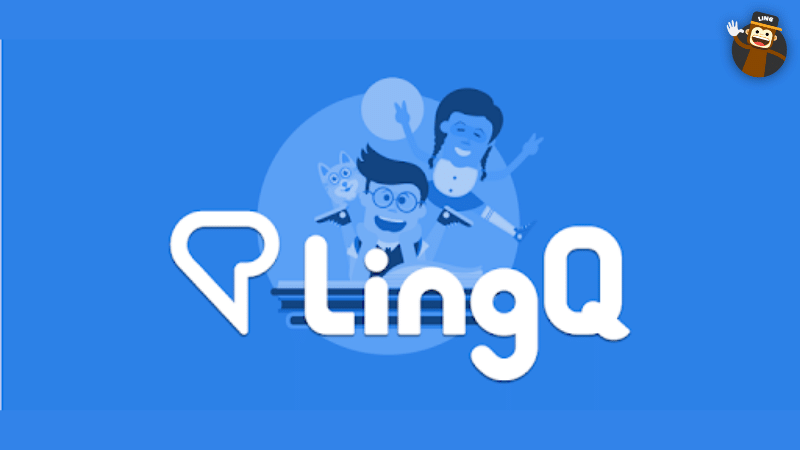
Topicalized Content
LingQ has various topics to make you feel in your comfort zone while learning a new language. You can choose topics according to your interests. This way, you don’t need to learn the words you are never going to use.
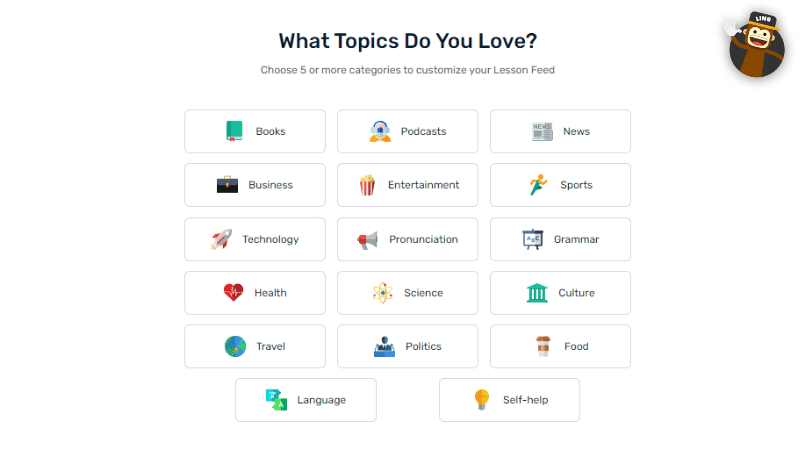
You can also import any written or audio (including videos from Youtube) material into LingQ and instantly turn it into an interactive lesson.
Import Option
Maybe, it is the most outstanding feature of LingQ. It gives you learning freedom in contrast to other language learning apps. You can choose what to watch, listen and read while studying with LingQ. In addition to their huge content library, you can also import anything (like youtube videos) into LingQ and instantly turn it into an interactive lesson. Well, this is something that not many apps provide to their users.
Spaced Repetition System (SRS)
Learning in context is obviously more effective than drilling random words. You will learn maybe hundreds of words, but the Spaced Repetition System (SRS) helps you learn the words that matter to you most.
The flashcard algorithm of LingQ is based on Spaced Repetition, so the words that you’ve just learned or you are more tend to forget will be shown to you more frequently than others when you study with flashcards.
Mini Stories
There are many mini-stories in LingQ. It enables you to learn the unknown vocabulary in-text. Another cool thing about it is that there is also an audio recording option on top which is a native speaker reading aloud that specific story.
It is a fantastic way to master your listening, reading, and pronunciation skills all at once. If you use it like shadowing or imitating techniques, it’d be pretty helpful when it comes to speaking confidently in your target language.
Premium Version Of LingQ
The premium version price is normally €12.99 for a month, however, if you purchase a 12-month package it costs you €8.99 per month. Well, if you ask me, the free version is already very useful but if you are thinking about purchasing the premium version, have a look at these premium features before you decide.
- Unlimited vocabulary LingQs
- Unlimited imported lessons
- Vocabulary import
- Offline access on mobile apps
- Print or edit lessons
Pros & Cons
| Pros | Cons |
| Interactive lesson design | Confusing website design |
| Useful for all levels | Gamifying is not very successful |
| Wide variety of languages | Some bugs in beta languages |
| Free version available |
Duolingo: First Look
Duolingo is undeniably the most popular language-learning website and mobile app. It is also one of the most downloaded language apps in the world and it has a great number of language courses. Duolingo is perfect to learn the basics of a new language and have general knowledge of grammar.
Duolingo is based on a translation system from your native language which is a highly criticized language teaching method by language teachers and polyglots. But still, it had a place in every language learner’s own lessons. If you are a total beginner, a Duolingo course will teach you new vocabulary. Moreover, learning grammar is pretty simple with Duolingo.
But is Duolingo competent in language skills (especially in speaking skills)? Let’s go over the features of Duolingo together!
Features Of Duolingo
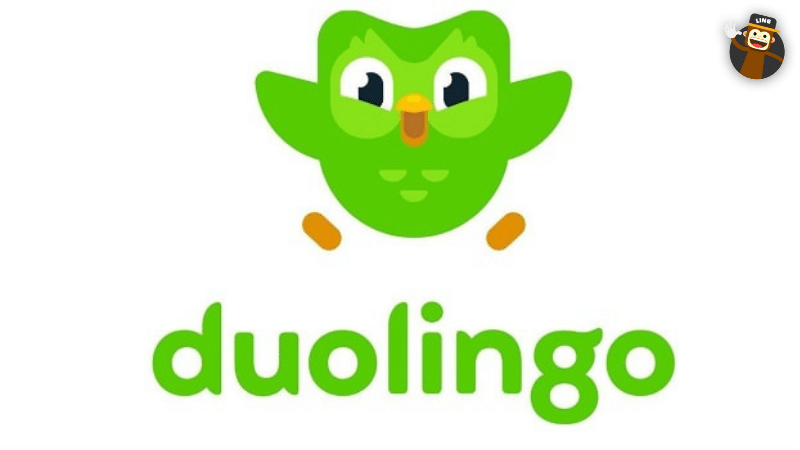
Gamified Approach
Every language course consists of a tree system in Duolingo. As you finish lessons one by one, you reach a checkpoint. As you complete lessons, they turn into gold but they may crack, so it means you should revise those lessons. You have to complete all checkpoints to pass that language course. Every time you make a mistake a heart goes down and when you don’t have hearts anymore you have to wait until they are refilled.
Lesson Design
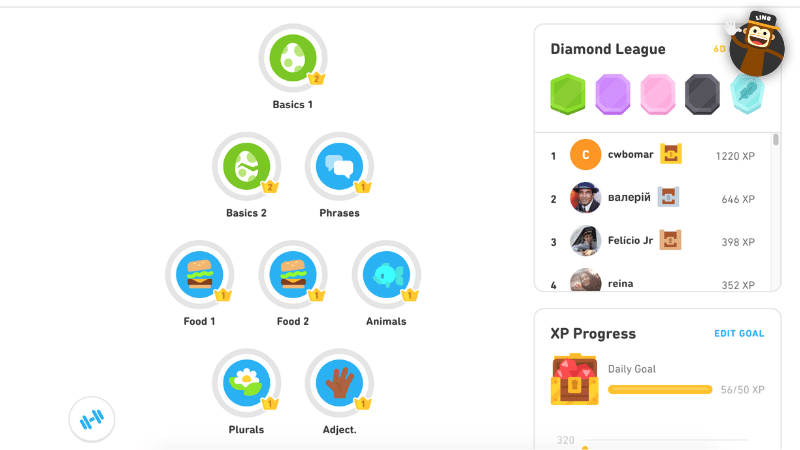
In Duolingo, you practice writing (typing), reading, speaking and listening in each lesson. The lessons follow the same plan no matter how many lessons you have completed. All activities are based on translating between two languages. I am not a fan of this teaching method because there can be both grammatical and contextual differences among languages, and making a translation word by word is not always a healthy approach.
Motivational Competition
You can compete with both your friends on the Duolingo leaderboard and with 50 random Duolingo users. The leaderboard is updated on Mondays. Duolingo Leagues are designed to motivate you to go on your language learning studies. In Duolingo, there are ten leagues in total. Only the first 10 learners level up to the next league, while the last ten learners are demoted back to the previous league.
Short Stories
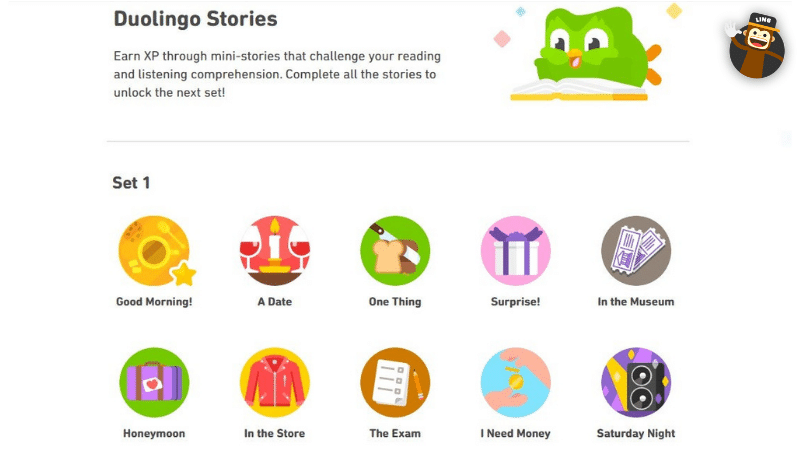
With Duolingo, you can read short stories on your proficiency level. There are various sets of stories that have different topics. The more you read, the more difficult they become. Each story turns into gold after you finish them but you can reread them anytime.
Podcasts
Podcasts are a free feature of Duolingo. Unfortunately, they are not available in most languages. As far as I know, they are only available in English, Spanish, and French. If you are studying one of these languages, you can give it a try.
Pros & Cons
| Pros | Cons |
| All language courses are free | Not suitable for advanced learners |
| Motivates language learners | No topical categorization |
| Appealing design | Repetitive lessons |
| Unuseful phrases | |
| Distracting ads |
Which Is Better LingQ Or Duolingo?

Actually, LingQ and Duolingo are very different from each other in terms of content, even though they both aim to teach languages online. Duolingo is based on translation between two languages, LingQ, on the other hand, is based on immersion in the language with the help of authentic materials created for native speakers.
If you want to be able to communicate in your target language in a relatively shorter time or let’s say you want to master your communicative language skills, then the LingQ would be a perfect match for you.
But, if you are a beginner who wants to learn general rules of grammar as well as vocabulary at a slow pace, then Duolingo would be suitable for you.
Still couldn’t find what you are looking for? Maybe wondering what are the LingQ alternatives out there? We’ve got you! Give this amazing language app below a try!
Learn Languages With The Ling App!
If you are still feeling indecisive about which app is the best for you, here is another great language app for you: The Ling App!
The Ling app is an effective language learning website offering more than 60 language courses. Ling App has already been featured by many platforms and it has been scored 4.8 by thousands of users on Play Store.
It has a gamified teaching method with interactive language practices and activities. You can master your new language with all aspects such as reading, writing, listening, and speaking by using the Ling App for only 10 minutes a day. I guarantee that you will become much more motivated to learn a new language thanks to this app. You can get the Ling App from both the App Store or Play Store. What’s more, is that you can try it out for free!
What are you waiting for? Download the Ling App and start learning right now!

























